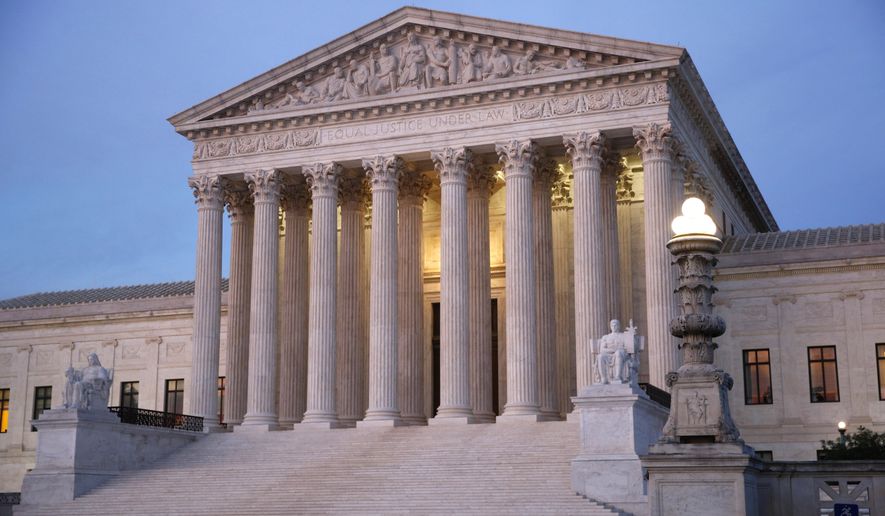Chief Justice John G. Roberts Jr. derailed President Trump’s plans to ask about citizenship on the 2020 census, ruling Thursday that he just didn’t trust the administration’s stated reasons for why it wanted to do so.
In a complicated ruling, the Supreme Court sent the case back to a lower court with instructions to give the Commerce Department a do-over and come up with a more convincing explanation. But the ruling was handed down just three days before the department’s self-imposed deadline for finalizing the 2020 questionnaire.
Mr. Trump, on Twitter, said he has asked whether the department can push back its deadline in order to get the question approved, but based on what officials have told the courts, that could be a stretch.
“Seems totally ridiculous that our government, and indeed Country, cannot ask a basic question of Citizenship in a very expensive, detailed and important Census,” Mr. Trump tweeted.
The chief justice was the swing vote. He sided with the court’s four Democratic appointees and against Mr. Trump, who had staked significant political capital on the citizenship question.
In his opinion, Chief Justice Roberts said it is legal to ask about citizenship — indeed, it used to be a regular part of every census — and that Commerce Secretary Wilbur Ross gave a valid explanation. But he said something just didn’t ring true.
SEE ALSO: Supreme Court rules federal courts can’t police partisan gerrymandering
“We cannot ignore the disconnect between the decision made and the explanation given,” he wrote. “Reasoned decisionmaking under the Administrative Procedure Act calls for an explanation for agency action. What was provided here was more of a distraction.”
Mr. Ross told the court he was acting at the behest of the Justice Department, which said it wanted the information to better enforce voting rights laws. But during several legal challenges, evidence emerged that Trump confidants with political motives may have encouraged Mr. Ross.
The case produced a web of concurrences and dissents.
The court’s Democratic appointees agreed with Chief Justice Roberts that the citizenship question was not justified. Mr. Ross cut too many corners, they said, so his decision to add the question was illegal.
On the other side were four Republican-appointed justices, led by Justice Clarence Thomas, who said the court broke new — and unfortunate — ground by invalidating a Cabinet official’s actions “solely because it questions the sincerity” of the explanation.
“Unable to identify any legal problem with the secretary’s reasoning, the court imputes one by concluding that he must not be telling the truth,” Justice Thomas wrote.
SEE ALSO: Supreme Court upholds blood tests sans warrant for unconscious drivers
He said the ruling created perverse incentives for loud opponents to gin up controversies, make enough noise and hope to entice a sympathetic judge to intervene and police an agency’s action, tying up decisions in years of depositions and legal discovery.
Mr. Trump, traveling in Japan, took to Twitter to complain.
“Can anyone really believe that as a great Country, we are not able the ask whether or not someone is a Citizen. Only in America!” he tweeted.
The Trump Justice Department said it was disappointed by the decision but noncommittal about its next steps.
“The Department of Justice will continue to defend this administration’s lawful exercises of executive power,” said spokesperson Kelly Laco.
J. Christian Adams, a former Justice Department lawyer and voting rights analyst, said Chief Justice Roberts bought into left-wing carping and decided that “was more important than the common sense of asking the question in the first place.”
“This is an unfortunate victory for the swamp that opposed collecting facts about how many aliens are in the United States,” Mr. Adams said.
The court announced the ruling on the final day of its 2018-2019 term, saving, as it usually does, the most politically charged decision for last.
The full panoply of Mr. Trump’s opponents — Democrats on Capitol Hill, Democrat-led states, immigrant rights groups and the broader liberal coalition of racial and ethnic activists — had challenged the citizenship question.
They argued that Hispanics and immigrants in particular will refuse to fill out the census form, distorting the count.
Even though the census answers are supposed to be shielded by law, the fear that Mr. Trump has created and those groups have stoked will frighten people from participating, the challengers argued.
Judge Jesse Furman, who oversaw the case that reached the Supreme Court, found that 5% of noncitizens would refuse to answer the census.
He was one of three district judges to rule against the Trump administration, deciding that officials broke procedural law in their rush to get the question approved for the 2020 count.
The Supreme Court, in a rare move, heard the case on direct appeal, not waiting for it to go through the circuit courts. The goal was to get a decision before the questions have to be finalized and the census questionnaire printed.
Census officials say that deadline is this weekend.
The court’s decision demanding a do-over likely means there is no chance of making that deadline.
The case took on a surreal aspect in recent weeks as the administration’s opponents said they had dug up new evidence from a now-deceased Republican voting strategist who suggested the intent of asking about citizenship was to give Republicans better data to draw maps in the next round of congressional and state legislative redistricting.
The Trump opponents demanded that the case be sent back to lower courts for more investigation.
Chief Justice Roberts’ ruling ducks that issue, but the effect is the same since the case now goes back to lower courts.
• Stephen Dinan can be reached at sdinan@washingtontimes.com.




Please read our comment policy before commenting.